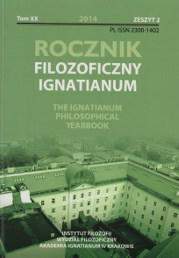Human Rights in the Magical World of Consumption
Abstract
The world of consumption and the consumerist society figure prominently within the social reality of capitalism. A distinctive feature of that world is that its focus on consumption is so strong as to justify speaking of an ideology of consumerism – one highly expansive in orientation, so that it takes in both rich and developing countries. The world of consumption is a world which delights --- at first sight --- due to its abundance of goods, the widespread access to them it offers, and its almost unlimited possibilities. Because of this, the wonder-inducing world of consumption is sometimes regarded as magical. The affluence which surrounds human beings seemingly does not call for any hard work or effort, while all goods seem to just appear miraculously on the shelves in shops. But is the world of consumption as wonderful as it seems at first sight? Is this world genuinely friendly? It seems reasonable to question the level of actual implementation of human rights in this world. This article aims to give answers to these questions.References
Baudrillard J (2006), "Społeczeństwo konsumpcyjne: jego mity i struktury" Warszawa Wydawnictwo Sic!.
Bylok F (2013), "Konsumpcja, konsument i społeczeństwo konsumpcyjne we współczesnym świecie" Katowice Wydawnictwo Naukowe „Śląsk”.
Dojčar M (1999), "Dialóg a jeho miesto v pluralitnej spoločnosti", In Ročenka Ústavu Pre vzťahy štátu a cirkví. Bratislava Vydavateľstvo UVSC.
Grabowska B (2010), "Samotny egoista czy odpowiedzialny obywatel? Rozważania na temat liberalnego ideału człowieka i obywatela" Toruń Wydawnictwo Naukowe Uniwersytetu Mikołaja Kopernika.
Hartmann N (1987), "Problem wartości w filozofii współczesnej", In N. Hartmann. Warszawa Wiedza Powszechna.
Król M (2005), "Bezradność liberałów: myśl liberalna wobec konfliktu i wojny" Warszawa Prószyński i S-ka.
Lipovetsky G (2003), "Éra prázdnoty. Úvahy o současném individualismu" Praha Prostor.
Lipovetsky G and Charles S (2006), "Les temps hypermodernes" Paris Le Livre de Poche.
Mariański J (1996), "Mieć czy być? Konsumizm jako styl życia --- wyzwaniem dla Kościoła" Kraków Wydawnictwo UNUM.
Mysona Byrska J (2013), "Nove hodnoty v magickom svete konzumpcie", In Fyzika a etika VIII. Veda ako kulturny fenomen. Nitra , pp. 283-291. Univerzita Konštantína Filozofa.
Przybyszewski K (2010), "Prawa człowieka w kontekstach kulturowych" Poznań Wydawnictwo Naukowe Instytutu Filozofii Uniwersytetu im. Adama Mickiewicza.
Ranciere J (2008), "Nienawiść do demokracji" Warszawa Instytut Wydawniczy Książka i Prasa.
Ritzer G (2009), "Magiczny świat konsumpcji" Warszawa Wydawnictwo Literackie ,,Muza''.
Ritzer G (2009), "McDonaldyzacja społeczeństwa: wydanie na nowy wiek" Warszawa Wydawnictwo Literackie ,,Muza''.
Środa M (2003), "Indywidualizm i jego krytycy" Warszawa Aletheia.
Szlendak T and Kozłowski T (2008), "Naga małpa przed telewizorem. Popkultura w świetle psychologii ewolucyjnej" Warszawa Wydawnictwa Akademickie i Profesjonalne.
Sztompka P (2007), "Zaufanie: fundament społeczeństwa" Kraków Społeczny Instytut Wydawniczy Znak.
Taylor C (2005), "Etyka autentyczności" Kraków Społeczny Instytut Wydawniczy Znak.
(2014), "Powszechna Deklaracja Praw Człowieka ONZ", 11, 2014.
(2014), "Karta Praw Podstawowych Unii Europejskiej", 11, 2014.
The Yearbook only accepts materials for publication that are free of all conflicts of interest, and that in no way involve conflicts over authorship, copyright, etc. The Editors will take action against any cases of plagiarizing, ghostwriting1, guest/honorary authorship2, etc. Where co-authored work is concerned, the Author listed first is expected to take responsibility for the submission, and is required to make clear the contributions of all of the Co-Authors involved. In the event of the publication owing its existence to funding dedicated to this purpose, this fact should be made clear: e.g. in any note of thanks/acknowledgement, or in a footnote, etc. Explicit notification should be given of any form of reprinting, with the appropriate evidence of permission to publish being furnished as required. Any impropriety on the part of Authors/Reviewers risks exposing them to appropriate responses from the relevant institutions.
______
1 This term refers to instances of a person who has made an essential contribution being omitted from the list of authors, or from notes conveying gratitude and/or acknowledgement.
2 This occurs when a person who has made either an insignificant contribution or no contribution at all nevertheless appears on the list of authors.





